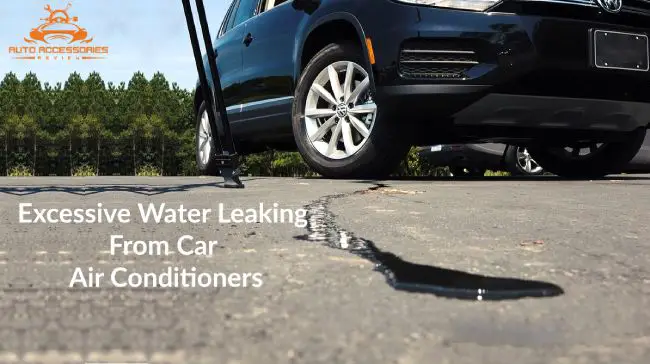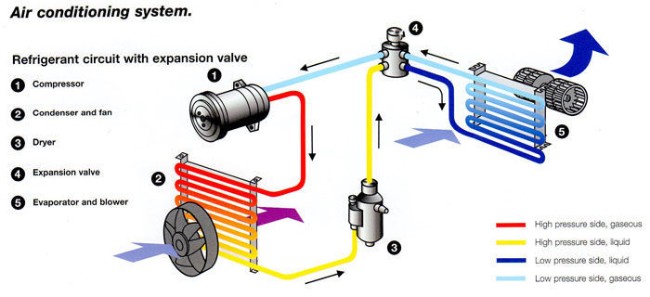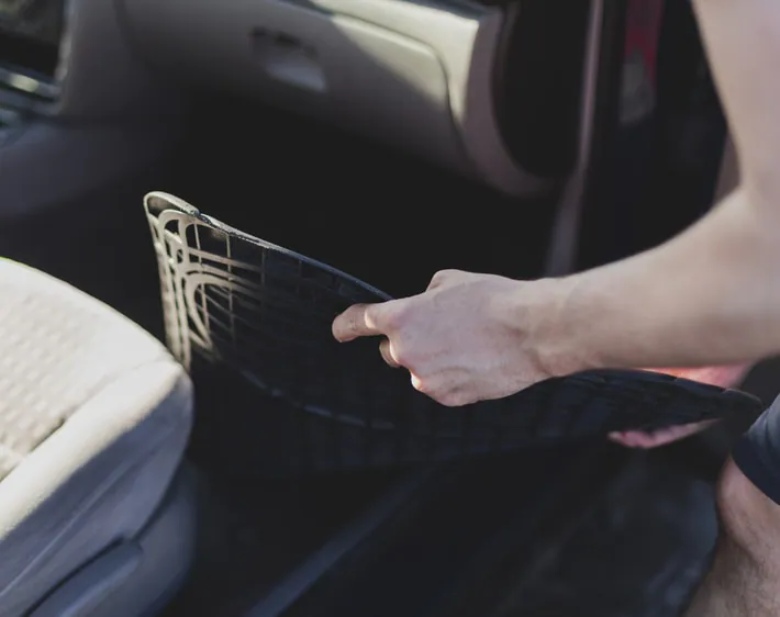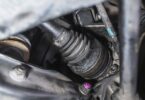Your car depends on a lot of fluids to keep functioning smoothly. It’s okay to get confused when you see a puddle of water inside/outside your car.
But if there is excess water leaking from the air conditioner, it’s time to take action!
Here we will show the reasons your car can leak water both inside and outside and how you can solve this problem. We’ll also talk about how the A/C system in your car works to help you understand what’s going on.
Let’s dive right in.
Reasons for Excessive Water Leaking From Car Air Conditioner

1. Blockage in the condensate drain pipe
The air conditioning system of your car is designed to dump all the water outside your car through the condensate drain.
If the drain gets clogged by dirt and debris, it can prevent the water from draining outside your vehicle. This will cause the water to overflow inside the car.
If you notice water building up inside the car whenever you turn the A/C on, this might be indicating a blockage in the condensate drain pipe.
The dirt and debris particle interacts with the moisture of the A/C unit and hardens inside the drain line.
2. The condensate drain is not properly attached
A similar thing can happen when your condensate drain isn’t installed correctly, leaving a leakage in the system.
The job of your condensate drain is to drain the water outside your car. If leakage happens, the water can build up inside your car and damage other components.
3. Low refrigerant level
Your car needs refrigerant to keep circulating cool air inside.
If the system has low or no refrigerant, this can decrease the pressure on your system and cause the evaporator coils to ice up and freeze.
When the coils get heated again, the ice melts and creates a water leakage.
Freezing the evaporator coils is always a bad sign. Sometimes it causes irreparable damages to itself along with other parts. That’s why regular maintenance is strongly recommended.
4. Dirty or blocked air filters
The job of your air filters is to trap and collect unwanted dust and moisture from the system. Over time, the residue builds up and blocks the air filters.
Blocked air filters can freeze up your car’s A/C evaporator coils, which will, in turn, cause water to overflow from the condensate drain into your car’s interior.
5. Broken condensate drain pan
Your condensate drain pan may break down due to wear and tear over time or by an accident. When the condensate drain pan breaks, it can cause water leakage inside your car.
6. Problem with the evaporator
The evaporator is a part of your A/C system that looks like a radiator. A blocked evaporator drain can cause water to build up into the evaporator core.
Additionally, the structure of an evaporator helps it to trap leaves and other biodegradable materials inside it. All of these biodegradable materials can cause the evaporator core to rust and create a leakage problem.
If you notice water coming out through the A/C vents, this is the most probable reason behind it.
7. Failed seals
Your car’s air conditioning system uses some plastic or rubber seals to make the system leakproof. If one or more of the seals fails, water will build up inside your car’s cabin.
How Air-con in Your Car Works

**Photo courtesy: Mechanical Booster
The main job of your car’s A/C unit is to maintain a cooler temperature inside your car’s cabin. The system achieves that by constantly circulating refrigerant around it.
When you turn your A/C on, the compression starts working. The compressor sucks in low-pressure, low-temperature refrigerant in gas form and compresses it into a high-pressure, high-temperature gas.
The gas then goes through the condenser. Airflow around the condenser cools the refrigerant down into a high-pressure, low-temperature liquid. The liquid then passes through the receiver drier/air filter that removes moisture from the liquid. It also filters dust and debris.
In most US cars, the receiver-drier is replaced with an accumulator that sits between the evaporator and the compressor, and the expansion valve gets replaced with an orifice tube.
After that, the liquid heads towards the thermal expansion valve. The valve regulated how much refrigerant can pass through the system. It also lowers the pressure and temperature of the refrigerant a little bit.
Lastly, the low-pressure and low-temperature refrigerant passes through the evaporator. The refrigerant collects temperature from the air passing through it and goes back to the compressor to repeat the cycle, and you end up with a cooler car, literally.
Car Leaking Water: Color Guide
What your car is leaking might not be water all the time. There are a bunch of liquids in use within your car and it can be confusing to determine what actually is leaking.
To help you with this, here’s a chart that shows different color liquids and their most probable symptoms:
Take a clean white piece of paper and check the color to find out what your car is leaking.
How Much Water Is Normal?
Cars drip water outside the cabin whenever you turn the A/C on. The amount of dripping depends on the weather outside. Usually, a small patch of water during a super hot and humid day is considered normal.
Your car can also leak water when it’s too cold outside. Take your time and inspect the leakage problem thoroughly. If the problem persists after an extended amount of time or you see a puddle of water inside/outside of your car instead of a few drops, it’s time for a check-up.
Where the Water Is Leaking
Inside
This is a clear sign of leakage (aside from non-A/C-related issues). If you notice water pooling inside your car during hot and sunny days when you use your car’s A/C the most, that might be caused by the leakage. Check your car ASAP when that happens.
Outside
The drainage system for your car is designed to dump the water outside the car. If you see a small amount of water dripping when you turn your A/C on during a hot sunny day, that’s normal.
Seeing a puddle beneath your car is not okay. If no water comes out even when your A/C is turned on in full power, that is also not good. Take professional help as soon as possible when you start noticing puddles outside your car.
How To Fix Excessive Water Leaking From the Car Air Conditioner
Some fixes of the issues mentioned above are really simple. A good understanding and a few tools are enough to solve most of the issues mentioned above.
However, the air condition system of a car can be a bit delicate to handle. That is why we recommend taking professional help. If you damage the exhaust pipe while trying to unclog it, that would create more problems, let alone solving the already existing ones.
Every car is supposed to go through a routine checkup at least once a year. We recommend you check the A/C system thoroughly at that time to make sure everything is running smoothly.
FAQs
1. Is it normal for A/C to leak water?
Ans: Yes, of course. The A/C system on your car works by removing moisture from the air. All that moisture has to go somewhere. That is why an exhaust pipe is attached to the system. It’s completely normal for your car’s A/C to leak water outside through the exhaust pipe.
2. When do you need a car air conditioning repair?
Ans: When you notice water building up inside your car, excessive water leakage through your exhaust pipe even on a normal day, or feel a reduction in the performance of your A/C, you’ll need a car air conditioning repair.
3. How can I stop water from leaking inside?
Ans: You can check your car yourself or take professional help. If you are familiar with your car parts, try checking the condensate drain and the evaporator for any possible clogs. Once the clog is clear, your car should be fine. If not, seek professional help.
4. Should I turn off my AC if it’s leaking?
Ans: Yes. Turn the A/C off whenever you notice an unusual leakage problem. This will stop the flow of water. The more water leaks out of your air conditioner, the greater the chance of potential damage becomes.
5. Does the A/C slow down when the car isn’t moving?
Ans: No. The air conditioning system should work just fine regardless of the car moving or not. If your A/C is less effective when the car is parked/still, this may mean that the condenser fan is broken/not working.










Leave a Comment